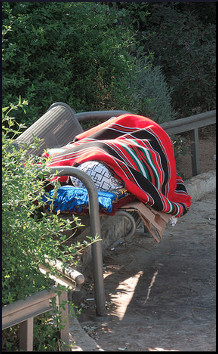
Are anti-camping ordinances constitutional? This question has lain dormant with occasional ominous tremors like those that precede an earthquake. It is a question with the potential to change the landscape literally, figuratively, and extensively. There was a big rumble in 2006, when Ninth Circuit Court of Appeals Judge Kim M. Wardlaw made what seemed like a groundbreaking legal decision that turned out not to be. We discussed why Jones v. City of Los Angeles kind of fizzled out.
But recently, the Ninth Circuit case became a factor to be reckoned with when the federal government turned its attention to Bell v. City of Boise, a case brought by Idaho Legal Aid Services and the National Law Center on Homelessness and Poverty. The Justice Department’s “statement of interest” quoted Judge Wardlaw, who said:
The Eighth Amendment prohibits the City from punishing involuntary sitting, lying, or sleeping on public sidewalks that is an unavoidable consequence of being human and homeless without shelter in the City of Los Angeles.
Here is the same news event, presented from the vantage point of a different mindset. The NY Post‘s Betsy McCaughey believes that living on the street is not acceptable. About that, we agree—but the meaning we assign to the words is vastly different. We would like clean, safe and affordable living conditions for all humans. McCaughey seems to wish that large segments of the population could somehow magically be made to disappear.
When a homeless advocate says that people should not be punished for their status, McCaughey characterizes that basic human decency as a “wacky ideology.” In our view, if people have no choice but to live on the streets, they should at least be legally protected.
McCaughey, on the other hand, is all about criminalizing survival, and sees the Justice Department’s interest in the Iowa case as the Obama administration “siding with vagrants against local governments.” We wish we could tell you the upcoming quotation was found in The Onion or some other satirical publication, but alas, we cannot. The outraged McCaughey says of people experiencing homelessness:
Their insistence on street living punishes the rest of us. We have to endure the heart-wrenching sights of human beings in rags lying on sidewalks.
Jones v. City of Los Angeles was vacated because of a compromise deal, but the analysis provided by Judge Kim M. Wardlaw was solid, which is why it is being called upon in Bell v. City of Boise. Writing for Slate.com, Mark Joseph Stern mentions other cases that influence the judiciary’s thinking in this matter. Robinson v. California and Powell v. Texas were both ruled on by the nation’s Supreme Court. Stern says:
In Robinson the court struck down a California statute that criminalized addiction—not just use or possession—of narcotics. California, the justices explained, could outlaw the conduct of drug use, but it could not criminalize the status of being addicted to drugs. Powell dealt with a similar law, one that criminalized public intoxication in Texas.
Since homelessness is a status, not a conduct, it seems reasonable to assume that the Supreme Court would also say that the Constitution forbids cities to arrest people for sleeping rough when shelters are full. Stern doubts that Bell v. City of Boise will reach that far, but it might slow down or partially reverse the criminalization of homelessness. Even if it doesn’t go to the Supreme Court, the lower-level resolution of Bell v. City of Boise will create a precedent that can be called upon in similar cases elsewhere, for better or worse. Stern adds:
It’s quite depressing to see the DOJ defend homeless people’s right to sleep by analogizing them to drug addicts and alcoholics. But its brief is really an indication of just how profoundly America has failed its homeless communities.
Source: “Team Obama’s fight to keep the homeless living on the streets,” NYPost.com, 08/18/15
Source: “Justice Department Tells Cities to Stop Criminalizing Homelessness,” slate.com, 08/14/15
Image by Albert Ter Harmsel
